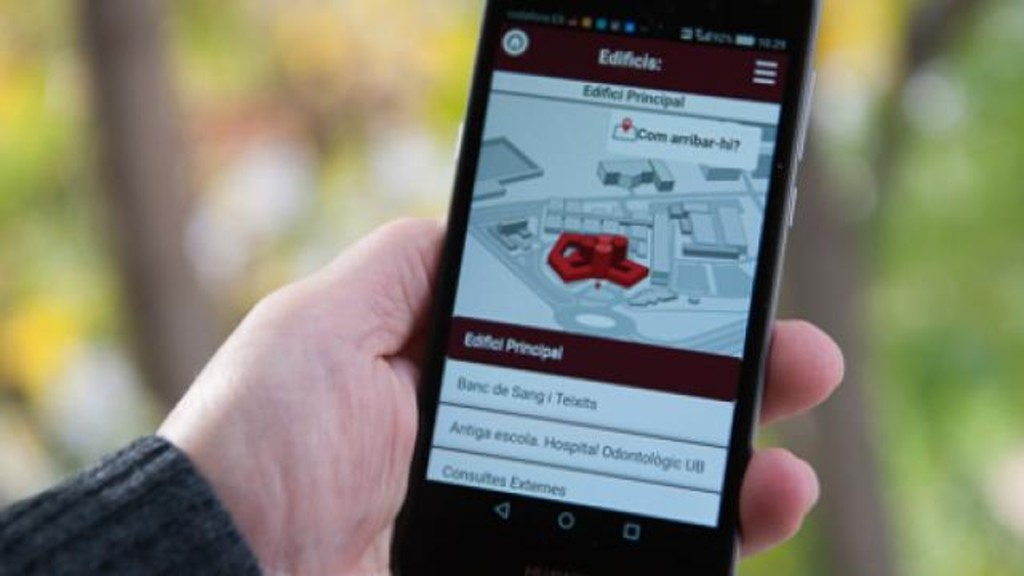UOC supports development of an app for surgical patients at Bellvitge University Hospital
QuiròfanHUB is the brainchild of Bellvitge University Hospital anaesthesiologist Esther Méndez and is aimed at providing essential information to patients undergoing surgery, a service that has become even more necessary in the post-COVID-19 eraThe project has been awarded a grant from the UOC's eHealth Center to accelerate its development

The idea for Esther Méndez's digital health project was sparked by her experience as an anaesthesiologist at Bellvitge University Hospital and her studies for the UOC University Master's Degree in E-health. QuiròfanHUB is a mobile application devised to reduce uncertainty among patients about to undergo surgery due to a lack of information about the procedure, which, as the doctor explained, "can lead to anxiety and make the experience more traumatic."
As a result of a grant awarded by the UOC's eHealth Center, the project will now be able to move on to the development phase. This is the first project to receive funding as part of the UOC's new eHealth Project: from idea to project initiative. This annual grant scheme, driven by UOC's Health Studies, acts as a radar to identify and promote digital health projects whose results could generate social impact for the healthcare system and its users.
E-health, an ally in the fight against medical misinformation
"Patients arrive in the operating room lacking the relevant information, despite being given all the facts during their appointments. And it is proven that people only retain between 20-30% of what they are told," said Méndez, highlighting a problem that has been further exacerbated by the COVID-19 pandemic. "Patients find it even harder to retain information during online appointments, resulting in increased uncertainty, both preoperatively and postoperatively. I'm absolutely convinced that e-health is the answer to helping patients and their family members access the information they need."
Méndez intends to add the mobile application to the range of other services offered to patients through Bellvitge University Hospital's medical applications repository, "El meu HUB'". The project has also been given the green light by the hospital's medical board as it corresponds to the strategic objectives established for the centre's priority areas of innovation.

Better patient support
As outlined by Méndez, "The project tackles three key issues." Firstly, it helps to inform patients, providing them with information about specific surgical procedures and telling them what they need to do to prepare and about the recovery process afterwards. Secondly, it helps to empower them by encouraging them to take an active role in their recuperation process and increasing their decision-making capacity. Finally, and most importantly, it facilitates personalized follow-up care by setting up a time-limited messaging system between the patient and the nursing team to field issues and queries.
Less anxiety, faster recovery
One of the cases cited by Méndez to defend her project was the postoperative mobile application developed for knee replacement surgery patients in the Netherlands in 2019, which resulted in, "Increased patient satisfaction and health benefits, with a reduction in postoperative pain; improvements in relation to rehabilitation, the performance of exercises and patient quality of life; and increased rates of user satisfaction." Other initiatives such as preoperative caesarean section or bowel surgery patients having access to explanatory videos on surgical procedures have also been demonstrated to reduce anxiety. In the words of Méndez, "Digital health offers benefits to patients and has huge scope for the future."
2021 colorectal surgery pilot
With the support received from the UOC, a joint project has now been able to be set up involving the IT Department at the Catalan Health Institute, a graphic design team and a team of medical practitioners headed up by Méndez.
The application will be developed on the basis of co-creation methodologies and the participation of a group of volunteer patients.
During the course of 2021, the team will conduct a pilot test in the colorectal surgical department as part of the hospital's existing ERAS (Enhanced Recovery After Surgery) programme, which helps patients prepare for the operation from a nutritional, physical and psychological perspective. The application will offer advice to patients and their family members through a variety of videos and infographics and provide them with a messaging system for resolving any doubts they may have. The plan is to make the app available to cover a minimum of 90% of all scheduled surgical procedures performed at the Bellvitge University Hospital by 2022.
The project supports five of the twelve strategic areas of action outlined in the Government of Catalonia 2016-2020 Health Plan: 1 (People, their health and the health system), 4 (Access and resolution), 6 (Integrated care and chronicity) , 8 (Excellence and security) and 9 (Evaluation and transparency).
This project is in line with Sustainable Development Goals (SDGs) 3, on good health and wellbeing, and 9, on industries, innovation and infrastructure.
UOC R&I
The UOC's research and innovation (R&I) is helping overcome pressing challenges faced by global societies in the 21st century, by studying interactions between technology and human & social sciences with a specific focus on the network society, e-learning and e-health.
Over 500 researchers and 51 research groups work among the University's seven faculties and two research centres: the Internet Interdisciplinary Institute (IN3) and the eHealth Center (eHC).
The United Nations' 2030 Agenda for Sustainable Development and open knowledge serve as strategic pillars for the UOC's teaching, research and innovation.
More information: research.uoc.edu. #UOC25years
Experts UOC
Press contact
-
Editorial department
